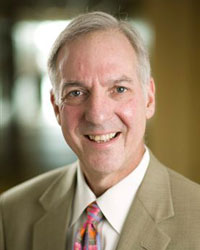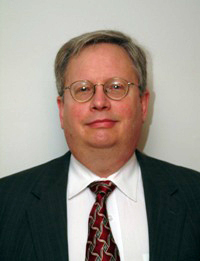 |
Ken Cowan, M.D., Ph.D. |
 |
James Talmadge, Ph.D. |
 |
Elizabeth Reed, M.D. |
Tonjes also believes that she benefited from a breast cancer vaccine study she participated in at UNMC where she received the vaccine following eight rounds of chemotherapy and 28 radiation treatments about four years ago.
“I think so far it has saved my life,” Tonjes said. “I thought it would be a good option to participate. I knew as a teaching institution, if it didn’t help me it would help someone else. Being stage III breast cancer, I would grasp at any kind of straw if that would help.”
Researchers think the vaccine may help prevent cancer recurrence. The vaccine, known as INGN 225, is a genetically engineered tumor vaccine that is made from the patient’s own cells and contains modified dendritic cells that have been artificially “infected” with a gene called p53.
P53, a tumor-suppressor gene, protects normal cells from DNA damage following exposure to sunlight and carcinogens. More than 50 percent of tumors, including breast cancer tumors, have a p53 mutation. While p53 is undetectable in normal cells, it’s over-expressed in tumors.
Following successful immunization, the vaccine theoretically “red-flags” the tumor cells as foreign and the patient’s own immune system will seek out and destroy the tumor cells that express mutant p53.
The pilot study Tonjes participated in was launched in 2005 at UNMC to determine if the vaccine is safe and effective in combination with surgery and chemotherapy in patients with early stage breast cancer that hasn’t spread. The study of 24 women also set out to find out when during treatment is the optimal time to introduce the vaccine.
UNMC was the first institution in the country to test a breast cancer vaccine made from dendritic cells, said James Talmadge, Ph.D., UNMC professor of pathology and microbiology and principal investigator of the study. The research team included UNMC physician/researchers, Elizabeth Reed, M.D., and Ken Cowan, M.D., Ph.D.
|
Dr. Cowan, director of UNMC Eppley Cancer, said the study is important.
“It’s one of the first trials to give the vaccine to relatively early stage breast cancer patients,” Dr. Cowan said. “Overall, the vaccine was well tolerated. There were few side effects.”
Dr. Reed, associate professor of internal medicine and director of the UNMC Breast Cancer Program, said though all the data of the study isn’t yet complete, researchers have learned important information.
She said the vaccine was found safe. They also found it effective — the vaccine elicited specific T-cell responses to p53. She said the vaccine works by recognizing the mutant p53 as a marker of tumor cells, allowing a targeted immune therapy to tumor cells.
“In half of breast cancer patients, p53 doesn’t work or functions poorly,” Dr. Reed said. “The concept behind the vaccine is that it might enable the patient’s immune cells, which recognize p53, to fight off cancer cells after treatment in an attempt to prevent cancer from returning.”
The vaccine, made from a small amount of the patients’ white blood cells, was given to patients in a series of four injections. Patients were divided into two groups and given the vaccine throughout the course of their treatment with chemotherapy and radiation, or at the end of their treatment.
Dr. Reed said she and her colleagues don’t yet know if the vaccine will be a viable additional treatment for breast cancer in some women.
She said the therapy may be an important addition for treating certain high risk breast cancers.
The next step, Dr. Reed said, is to publish the results and apply for grants to continue the work.